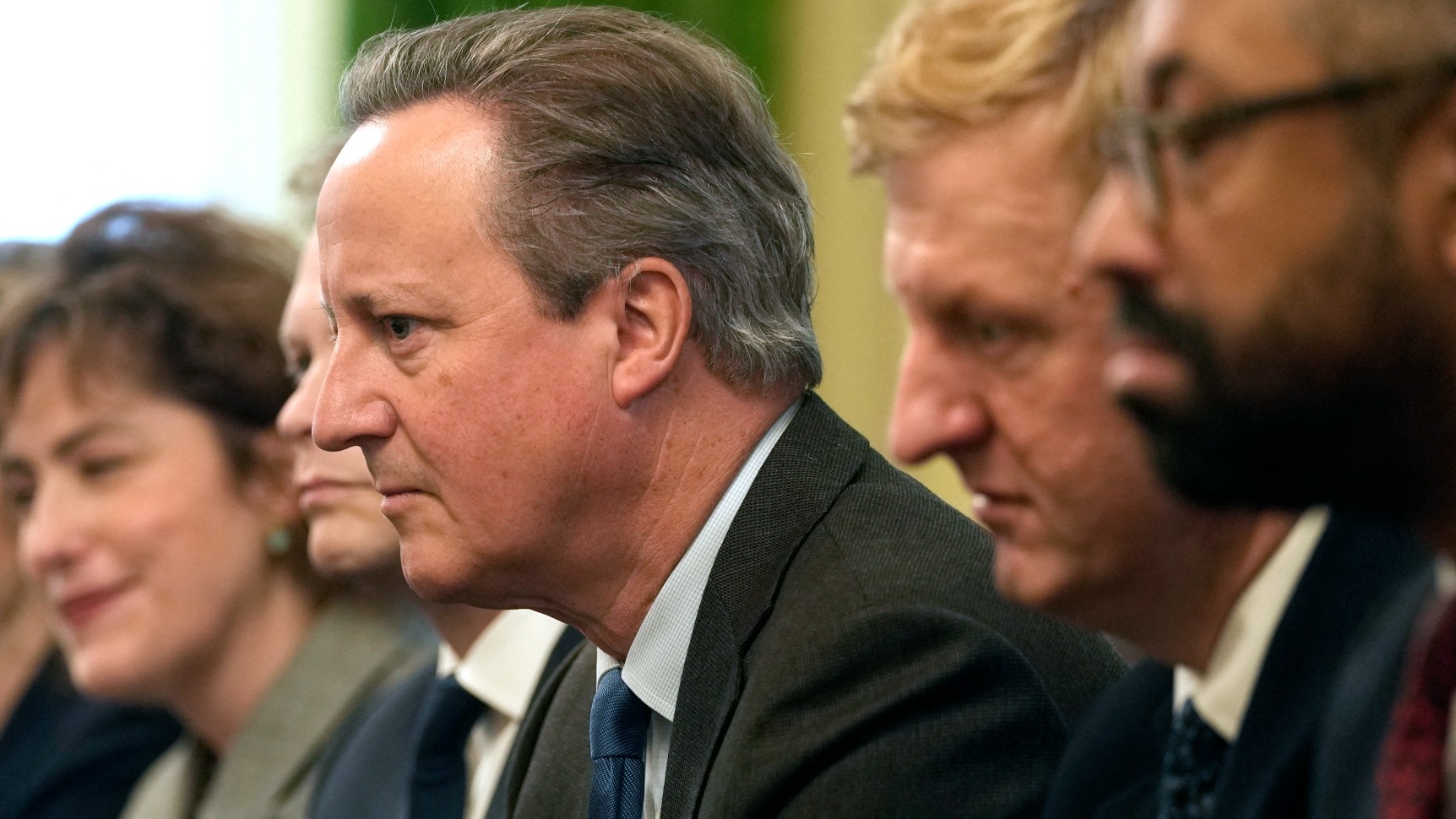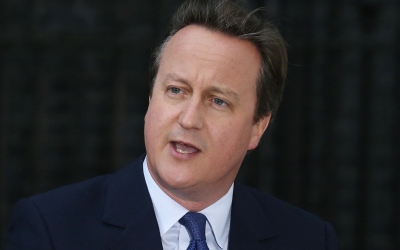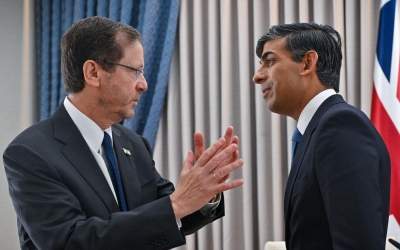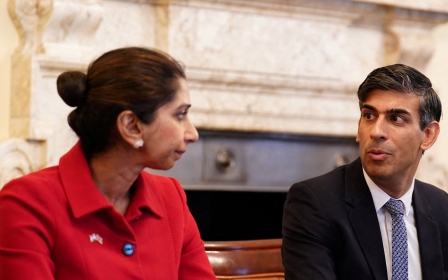Israel-Palestine war: Which David Cameron will show up?

Seventeen years ago, Israel fought a brutal five-week war in Lebanon against Hezbollah, marked by war crimes on both sides. Almost 1,200 Lebanese were killed, including many civilians, and some 165 Israelis.
During the conflict, Israel was accused of the same indiscriminate targeting of civilians that has been such a monstrous feature of today’s terrible conflict in Gaza.
Tony Blair, then-British prime minister and Labour leader, threw the UK's weight behind Israel, citing the country’s right to defend itself.
But one rising British political star thought differently.
David Cameron, the newly elected leader of the opposition Conservative Party, was so horrified by the reports he read that he allowed his shadow foreign secretary, William Hague, to issue a strongly worded public criticism of the Israel assault.
"I think we can say that elements of the Israeli response are disproportionate,” Hague told MPs in the House of Commons, going on to cite "attacks on Lebanese army units, the loss of civilian life and essential infrastructure, and such enormous damage to the capacity of the Lebanese government".
Good as his word
The response from Britain’s powerful pro-Israel lobby was immediate - and powerful. Stanley Kalms, a Tory donor and member of the Conservative Friends of Israel (CFI), wrote a letter to the Spectator, the house magazine of the Conservative Party, threatening to withdraw funding.
Behind the scenes, as I revealed in my Channel 4 Dispatches film Inside Britain's Israel Lobby, CFI head Stuart Polak went into action.
Follow Middle East Eye's live coverage for the latest on the Israel-Palestine war
He secured a meeting with Cameron in which the Tory leader gave what was understood as an undertaking not to use the word “disproportionate” again.
Throughout his time as Tory leader and British prime minister, Cameron was as good as his word. He never once used the word in connection with any Israeli conflict.
He did not step out of line two years later, when Israel was accused of the indiscriminate killing of Gaza civilians in “Operation Cast Lead”.
Six months after that terrible conflict, Cameron was the lead speaker at the CFI annual lunch, attended by many cabinet ministers, Tory MPs and businessmen.
Afterwards, I examined Cameron’s speech with curiosity, to see how he handled that recent catastrophe.
I was shocked to see that Cameron made no reference at all to the invasion of Gaza, the massive destruction it caused, or the estimated 1,370 deaths that had resulted. In fact, Cameron went out of his way to praise Israel because “it strives to protect innocent life”.
Six years later, Cameron was installed in Downing Street when Israel launched “Operation Protective Edge”. His support for Israel sparked the resignation of cabinet minister Sayeeda Warsi, who said that Cameron’s "approach and language during the current crisis in Gaza is morally indefensible", adding that it was "not consistent with the rule of law and our long support for international justice".
Two David Camerons
On 13 November, in an attempt to rescue his beleaguered government, Prime Minister Rishi Sunak appointed Cameron, who has been out of politics since quitting as prime minister in the wake of the 2016 Brexit referendum, as British foreign secretary.
By a ghastly coincidence, his return coincides with yet another war in Gaza, and by far the bloodiest yet.
He has been appointed by a prime minister who has promised Israel’s out-of-control far-right government his “unequivocal” support, has not uttered one murmur of criticism of Israel’s indiscriminate killing of more than 11,000 civilians, including well over 4,500 children, and refuses to support calls for a ceasefire.
Cameron’s record on Gaza offers no comfort at all. But I will make the case that he can emerge as a substantial British foreign secretary who can change Britain’s morally disgusting position on Israel's indiscriminate slaughter of Palestinians.
Cameron Mark One was the ambitious young man whom I knew three decades ago. This Cameron was sympathetic to the now almost defunct tradition of so-called 'Tory Arabism'
I have known Cameron for 30 years, ever since I was a raw political reporter on the London Evening Standard and he was a special adviser in the doomed John Major government of the 1990s.
In my view, there are two David Camerons: Cameron Mark 1, and Cameron Mark 2.
Cameron Mark 1 was the ambitious young man, already marked out for political stardom, whom I knew well three decades ago. This Cameron was sympathetic to the now almost defunct tradition of so-called "Tory Arabism".
Other members of the Arabist set included Winston Churchill’s grandson, Nicholas Soames, a defence minister in the Major government; the future Tory MP Hugo Swire; and Michael Ancram, who as a Conservative minister in the 1990s had played an important and sometimes personally brave role in the early negotiations with the IRA, which ultimately led to the Good Friday agreement.
Ancram, now Lord Lothian, later went on to develop friendly relations with senior members of Hamas in an attempt to apply the lessons of peace in Northern Ireland to the Middle East.
Harrowing conversation
The two most important members of the Arabist set were both early patrons of Cameron.
One was Douglas Hurd, regarded by many as the finest British foreign secretary of modern times. Significantly, Cameron went on to inherit Hurd’s Witney constituency.
The second was Chris Patten, Tory chairman when Cameron was rising up the party ranks. Cameron learned a great deal from Patten.
Indeed, it was a harrowing conversation with Patten, by then president of Medical Aid for Palestinians, that led Cameron to remark as long ago as 2010 that conditions in Gaza resembled a "prison camp".
During this relatively early stage of Cameron’s political career, he was strongly supportive of Muslim causes, worked closely with Muslims, and took an optimistic view of Islam.
As a new Tory leader, he went out of his way to promote the career of Warsi, offering her a peerage and place in the shadow cabinet as shadow minister for community cohesion. In 2007, two years after becoming Tory leader, he spent a week with a Muslim family.
He defended faith-based schools, supported multiculturalism, and mocked the right-wing trope of conflating the term "Islamist" with terrorism.
In one Guardian article, he wrote that “if we want to remind ourselves of British values - hospitality, tolerance and generosity to name but three - there are plenty of British Muslims to show us what they really mean”.
He supported the Iraq invasion, but not enthusiastically, and later I recall from a private conversation he showed signs of remorse.
Alliance with Murdoch
Cameron Mark 1 did not survive long after he became Tory leader in 2005. The turning point was probably not the bruising encounter with the Israeli lobby, which taught him the facts of political life after the Israeli invasion of 2006.
More likely was a sharp decline in his electoral fortunes. By the summer of 2007, Cameron looked doomed, lagging behind in the polls against the new Labour leader Gordon Brown.
To save his skin, he entered into an alliance with the Murdoch newspaper empire, hiring the former News of the World editor Andy Coulson - later to be jailed for his role in the phone-hacking affair - as his director of communications. Cameron Mark 2 was born.
He returns scarred by a career which at one time promised so much, but led to chaos and disaster, not just in Britain but abroad, too
In the short term, this alliance turned round Cameron’s political fortunes, ensuring the boost in the polls that took him into Downing Street as prime minister in 2010. But in the long term, the clasp of Murdoch proved fatal. It embroiled his government deeply in the phone-hacking scandal, may have encouraged his calamitous intervention in Libya, and led to the decision to call a referendum on Britain's membership of the European Union.
So which Cameron turned up for work at the Foreign Office on 14 November? Mark 1 or Mark 2?
My view has always been that Mark 1 is the closest to the real David Cameron and that the demands and compromises of raw power forced him into a political identity which did not represent his true beliefs. This, of course, is the fate of many successful politicians.
But Cameron is a highly intelligent man. He will have reflected on his failures in office. He returns scarred by a career which at one time promised so much, but led to chaos and disaster, not just in Britain but abroad too. He has been flung a lifeline to rescue his reputation.
I am probably wrong, but maybe, hoping against hope, it will be Douglas Hurd and Chris Patten’s protege, and not Murdoch’s creature, who takes charge of British foreign policy over the 12 months that remain until the inevitable defeat for the Conservative Party at the next general election.
The views expressed in this article belong to the author and do not necessarily reflect the editorial policy of Middle East Eye.
Middle East Eye propose une couverture et une analyse indépendantes et incomparables du Moyen-Orient, de l’Afrique du Nord et d’autres régions du monde. Pour en savoir plus sur la reprise de ce contenu et les frais qui s’appliquent, veuillez remplir ce formulaire [en anglais]. Pour en savoir plus sur MEE, cliquez ici [en anglais].








